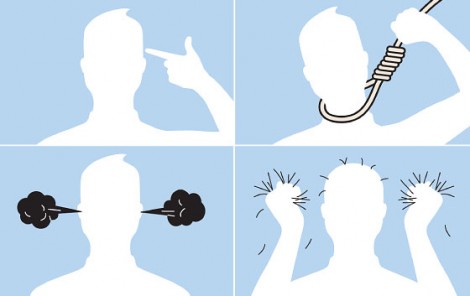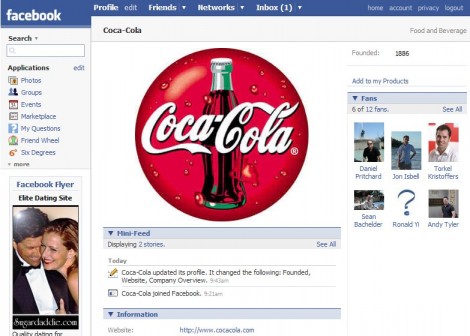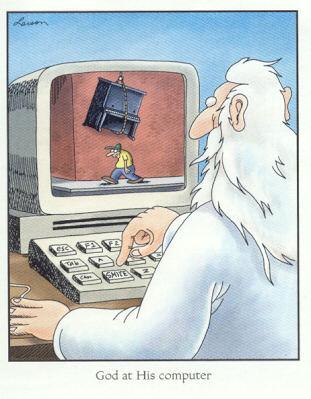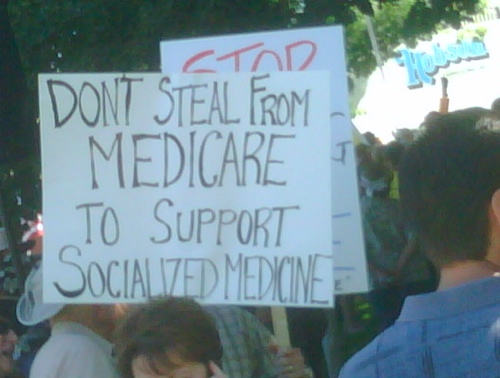By John Nichols
May 15, 2010 | The Nation
Domestic policy debates of late have degenerated into an absurd argument about whether government can do anything right. Even Democrats can be heard mouthing the false premise that private markets are always the answer to the nation's public problems. But government does do things right; indeed, it does something right every day on a massive scale. The oldest of America's major public services--established by decree of the Continental Congress, brought into being by Benjamin Franklin and enumerated in the first article of the Constitution as a vital tool for binding together the new Republic--carries on in the twenty-first century as an essential and possibly transformative arm of the federal government, a service that has only begun to tap this agency's potential.
This is the proper starting point for progressives to enter the great debate about the future of the US Postal Service--and enter they must if there is to be any hope for maintaining it at a time when public services are under overwhelming political and economic assault. Because of declining mail volume and Congressional reforms that transformed the Postal Service from a taxpayer-supported institution into a "revenue neutral" agency that is expected to pay for itself, the Postal Service recorded a $3.8 billion loss in 2009 and is, according to an extreme but oft-quoted estimate, on track to accumulate a $238 billion deficit by 2020. The service has also been harmed by poor political and managerial choices--not to mention accounting errors that have socked it with pension liabilities that are as unsustainable as they are unreasonable.
The Postal Service's economic turbulence has fostered the fantasy that it is no longer necessary in an age when "warp-speed Internet" is constantly juxtaposed against "snail mail." Yet the USPS is anything but "an anachronism" on "a slow march into oblivion." It is a national treasure that provides an immense and irreplaceable public service. The scope and character of that service will change in the twenty-first century--ideally to provide a broader range of information, vote-by-mail systems, community services and even banking options to hundreds of millions of Americans who continue to rely on their local post office as the nerve center of their neighborhood or small town. But before any of this can happen, we must recognize that the Postal Service can and must remain public if we are to maintain the essential infrastructures of democracy.
Americans do not often talk about the Postal Service as a crucial underpinning of the democratic infrastructure, but we should. At a time when 35 percent of all Americans and 50 percent of rural residents have no broadband Internet access at home, the Postal Service is universal. Its 596,000 career employees travel more than 4 million miles to deliver more than a half-billion pieces of mail each day. It goes to extraordinary ends to assure that no citizen or community is neglected; it contracts commercial planes to move parcels across the country in a matter of hours, yet it still sends bush planes into Idaho's River of No Return Wilderness Area and organizes mule trains to deliver mail, food and supplies to the Havasupai Indians on the floor of the Grand Canyon.
The Postal Service maintains a network of more than 35,000 retail outlets--the largest in the world, with more locations than McDonald's, Starbucks and Wal-Mart combined--which are visited by more than 7 million Americans each day. The postal workers they encounter in these offices and on their doorsteps are reflective of their communities, as the service has historically been and remains one of the surest sources of employment for African-Americans, Asian-Americans, Latinos, women and the poor. In short, the USPS forms a vital network of service, connection and community that provides the steadiest link between Americans and their government. As Postal Regulatory Commission (PRC) chair Ruth Goldway puts it, the service is "part of the fabric of the nation."
Unfortunately, the Postal Service is not profitable. That's a problem because, under the absurd constraints placed on it by successive legislative "reforms," the service must be "run like a business." And the businesspeople who run the USPS these days, though they may want to save the service, are so fixated on the bottom line that they cannot see the public good. So they have proposed a process of downsizing that could lead to the dismemberment of what should be understood as a core civic institution.
If the wrecking crews are not stopped, they will tear a hole in the fabric of the nation, further isolating Americans from one another, deepening the decay of urban neighborhoods and remote villages, hiking unemployment in our hardest-pressed communities and accelerating the decline of newspapers and magazines, drying up content for the Internet and curtailing civic and political discourse. "We need the Postal Service," says Illinois Congressman Danny Davis, a member of the House subcommittee that oversees the nation's post offices. Of course the Postal Service is going to change, Davis acknowledges. But Americans should start with the understanding that the Postal Service is "indispensable"--not with a debate about how much will be cut.
Regrettably, the latter approach is the one being taken by Postmaster General John Potter and members of the Postal Board of Governors, who are floating proposals to eliminate six-day mail delivery, close thousands of post offices and cut 26,000 full-time and 13,000 part-time jobs through attrition and layoffs. Overreacting to changes in the way Americans communicate while underestimating ideas that could reposition post offices as touchstones for the information revolution and a more consumer-friendly financial-services landscape, Potter and his compatriots imagine that the only response to a rough stretch is to slash the USPS. The madness of the cuts is summed up by Senator Susan Collins, a Maine Republican, who says, "The Postal Service cannot expect to gain more business, which it desperately needs, if it is reducing service."
Even the service's most determined defenders say that if the restructuring proposed by Potter goes through, the end result will not be the "leaner, more market responsive Postal Service" the postmaster general imagines. Rather, as American Postal Workers Union president William Burrus says, "It would be the beginning of the demise of the Postal Service."
But, of course, Americans will still need to communicate using paper and printed materials, and they will still need to ship all those parcels ordered over the Internet. The Postal Service's demise would not mean the end of those enterprises, just the end of postal workers' jobs and the service's commitment to communities that might not be the priorities of private companies like FedEx. Indeed, the downsizing of the Postal Service has often been discussed as the first step toward a huge bartering off of its responsibilities. Burrus has been saying for years that the service "has begun to travel resolutely down the road of privatization." And the Washington Post is editorializing, "Given the state of technology, privatization is probably the only long-term solution for the USPS."
Thankfully, privatization has a powerful critic. In response to a question posed in February about selling the Postal Service to the highest bidder, President Obama said that privatization is a "bad idea most of the time" because "oftentimes what you see is companies want to buy those parts of a government-run op that are profitable, and they don't want to do anything else. So, for example, the US Postal Service; everybody would love to have that high-end part of the business that FedEx and UPS are already in--business to business, you make a lot of money. But do they want to deliver that postcard to a remote area somewhere in rural America that is a money loser? Well, the US post office provides universal service. Those companies would not want to provide universal service."
Like many members of Congress, the president has sent signals suggesting a discomfort with cutting mail delivery down to five days. But he's been less engaged with the equally serious threat posed by proposals to increase stamp prices and rates for weekly newspapers and magazines, two moves that threaten to drive more paying customers away from a service that has seen annual mail deliveries drop from 208 billion pieces in 2000 to 177 billion pieces last year.
That drop in mail volume is often blamed for the Postal Service's fiscal troubles, but as economist Dean Baker notes, the service "has been scaling back its workforce more than proportionately to the decline in mail volume, increasing the productivity of its workforce. This is exactly how we would expect a private business to respond to the decrease in demand for its services." According to Baker, "The cause of the [current] shortfall has been the requirement put in place by Congress in 2006 that the Postal Service pre-fund 80 percent (up from 50 percent at present) of retiree healthcare benefits. The rule required that they reach this funding level in ten years. The Postal Service spent $12.4 billion to reach this pre-funding target over the last three years, an amount considerably larger than its $11.7 billion shortfall over this period."
In addition, argues USPS inspector general David Williams, the service was overcharged $75 billion by the government for pension liabilities when the Office of Personnel Management miscalculated its obligations. And, notes Baker, the Postal Service was "prevented by the Bush administration from applying for the employer subsidies available under Medicare Part D to businesses that provide drug coverage to retired workers." What it all adds up to, according to Williams, is a pattern of "inequitable...financial entanglements between the Postal Service and the federal government" that are "generally at the expense of the Postal Service."
With encouragement from the postmaster general, the House has taken steps to address some of these concerns, and Baker suggests that Congress should order an independent assessment of the key accounting issues. These moves, if approved by the Senate and the White House, would considerably ease the service's economic uncertainty. That does not mean, however, that postal unions and defenders of the public interest should breathe a sigh of relief. Rather, the current focus on the circumstances and prospects of the agency creates an opening for a radical rethink of those "entanglements."
Today the Postal Service exists in a netherworld where it must provide universal service--a classic public good--and at the same time break even; it must "compete" with private parcel services while providing them with platforms to expand their nonunionized and nonuniversal businesses; it must meet the demands of Congress while getting by without tax dollars.
Instead of entertaining ill-thought-out discussions about how to squeeze the Postal Service even more than it has already been squeezed, Congress needs a precise picture of what is threatened when we talk of going to five-day delivery, shuttering post offices, laying off experienced postal workers, hiking rates for newspapers and magazines (including, it should be noted, publications such as The Nation) and privatizing pieces of what is supposed to be a ubiquitous public service.
These "efficiencies" threaten more than just the Postal Service. They pose direct and indirect threats to democracy. Oregon Senators Ron Wyden and Jeff Merkley noted as much when they asked Congress and the USPS to avoid taking steps that would damage their state's mail-in balloting. "While we admire and encourage examination of avenues to modernize the postal service, the implementation of this proposal would pose a direct threat to democracy in Oregon," wrote the senators, whose concerns have been echoed by election officials from around the country, which increasingly relies on the Postal Service to carry regular and absentee ballots.
The PRC's Goldway has been at the forefront of arguments for taking state-based "Vote by Mail" experiments national. "Voters would not need to take time off from work, find transportation, find the right polling station, get babysitters or rush through reading complicated ballot initiatives," she explains. "The country's 35,000 post offices could provide information, distribute and collect voting materials and issue inexpensive residency and address identifications for voting purposes. Perhaps most important, given the concerns about voting machine security, mail ballots cannot be hacked. Tampering or interfering with mail is a federal crime, and the United States Postal Service has its own law enforcement arm, which works closely with a variety of enforcement authorities including the F.B.I. Trained election clerks can take the time to check signatures without delaying or discouraging voters. And the advantages of a paper trail outshine the glitter of black box electronic gadgetry."
That's one of many visions for giving the Postal Service new and necessary responsibilities that are in sync with its historic mission. Another would be to dramatically reduce the rates charged the weekly newspapers and journals of opinion that sustain our civic and democratic discourse in their traditional print form and online. A new Columbia Journalism Review survey of more than 600 websites of print magazines suggests that magazines that do not make a profit on the web are nonetheless providing immense amounts of web content. Roughly half the magazines surveyed provide all significant content from their print editions free on the web, although many of their websites are losing money. In other words, print publications are subsidizing the web even as they struggle to survive in an age of declining circulation rates and dipping advertising revenues.
CJR presented its survey as "the beginning of a long-overdue conversation" about the relationship of magazines to the web. That conversation, the editors suggest, should focus on the role print publications and their websites play in the "flow of information on which our democratic society is predicated." Before postal rates are raised for journals of opinion and other content-rich print publications, researchers should determine the extent to which these publications are powering serious discourse in the digital age. Logic suggests this research will conclude that reducing postal rates for small magazines and newspapers will strengthen the scope and quality of the debate, not only in print but online. This is a public service investment that would seem to make particular sense when everyone is worried about how we're going to sustain journalism during the difficult transition to the digital age; and, again, it is entirely in keeping with the mission of the Postal Service, which at its founding fostered the development of robust newspapers and journals of opinion with massive postal subsidies.
In the transition to a digital future, the Postal Service is neither at odds with nor resistant to new technologies. Indeed, just as the service was the driving force behind the expansion of a younger nation's roads, railways and air transportation systems, it is now at the forefront of developing and implementing digital advances. The Postal Service maintains the world's third-largest computing infrastructure--including more than 5,000 remote locations that receive Internet service via satellite. It operates the world's largest intranet system and is the world's leader in optical character recognition technology. Its ZIP code system serves as the structural underpinning for the nation's 911 emergency system.
Now the Postal Service should begin to consider the potential its network of physical facilities has to play in closing the digital divide. Thousands of neighborhoods and rural communities that do not have libraries or other easily accessible public facilities have post offices; shouldn't every post office have a hot spot with high-speed broadband? And shouldn't the Postal Service be reimagining itself, in the way that highly innovative postal services in other countries have, as a media and technology innovator and service provider--think digital mail, to start with. "We believe we are in the communication business, not just in the physical letter-mail business," explained Swiss Post executive vice president Frank Marthaler, in a recent interview with the magazine Monocle, which portrayed Marthaler and his colleagues as occupying "unique turf at the intersection of data networks and the old-fashioned letter routes, with the ability to carve out an unrivalled position in the digital age."
When the conversation about the Postal Service's future is turned on its head, it becomes evident that this public utility does not need to be ever on the defensive. It could remain a government-owned entity with a core public-service mission and the flexibility to achieve that mission, as has Swiss Post, which was radically restructured in order to adjust to the new communications landscape. Indeed, the post office is precisely where the federal government should be making smart infrastructure and job-creation investments, as part of a new approach that seeks to maintain a public asset and maximize its potential.
Such an approach might even renew one of the greatest of all postal services. From 1910 to 1967, the agency maintained a postal banking system that allowed citizens to open small savings accounts at local post offices. The system was so successful that after World War II, it had a balance of $3 billion--roughly $30 billion in today's dollars. Congress did away with postal banking in the late 1960s, but other countries--notably Japan--have maintained such systems. Today, Japan Post is, according to the Wall Street Journal, "the world's largest financial institution by assets, with $3.3 trillion on its balance sheet."
In the midst of the 2008 financial panic, Michael Lind, policy director of the Economic Growth Program of the New America Foundation, proposed that "a new postal savings system should be part of America's post-meltdown financial architecture." "When Congress created the postal savings system nearly a century ago, one of its goals was to encourage savings among the large number of low-income immigrants," Lind wrote. "A new system would help today's immigrants as well as the native poor. Banks are not interested in people with so little money, many of whom are preyed upon by payday lenders and credit card companies." The National League of Postmasters has started talking up the idea, and even Postmaster General Potter has hinted at openness to what Lind describes as a "simple" notion: "use the one government institution that can be found in most neighborhoods and rural areas--the post office--to encourage small savings and a habit of thrift." From that simple idea could, he suggests, come financial security for millions of Americans, an alternative to growing indebtedness of the country to foreign governments and financial institutions, and a vehicle to fund investment in public assets like sewer systems and bridges.
That's quite a payback for believing in the promise of the Postal Service. But, just as it did in Ben Franklin's day, the post office can still deliver for America in the twenty-first century.








